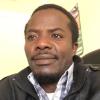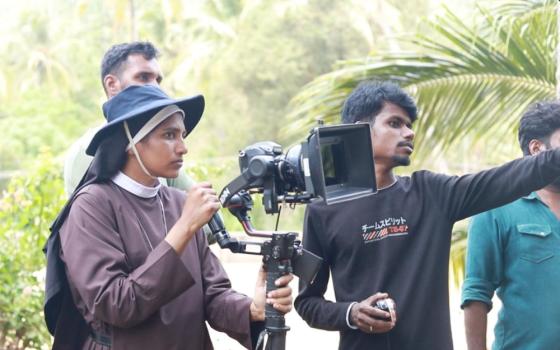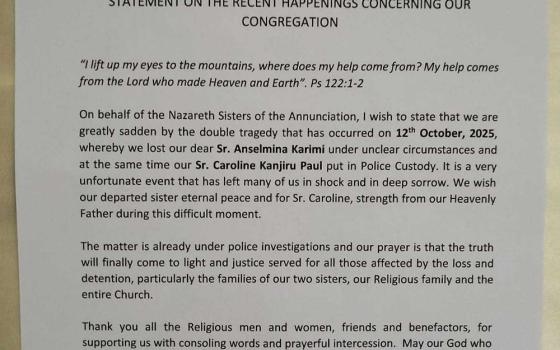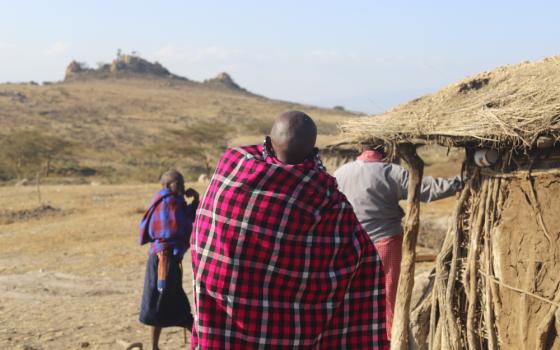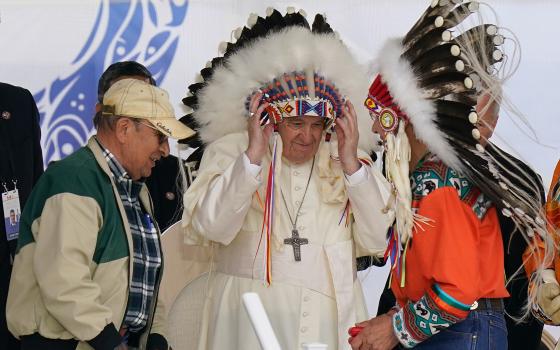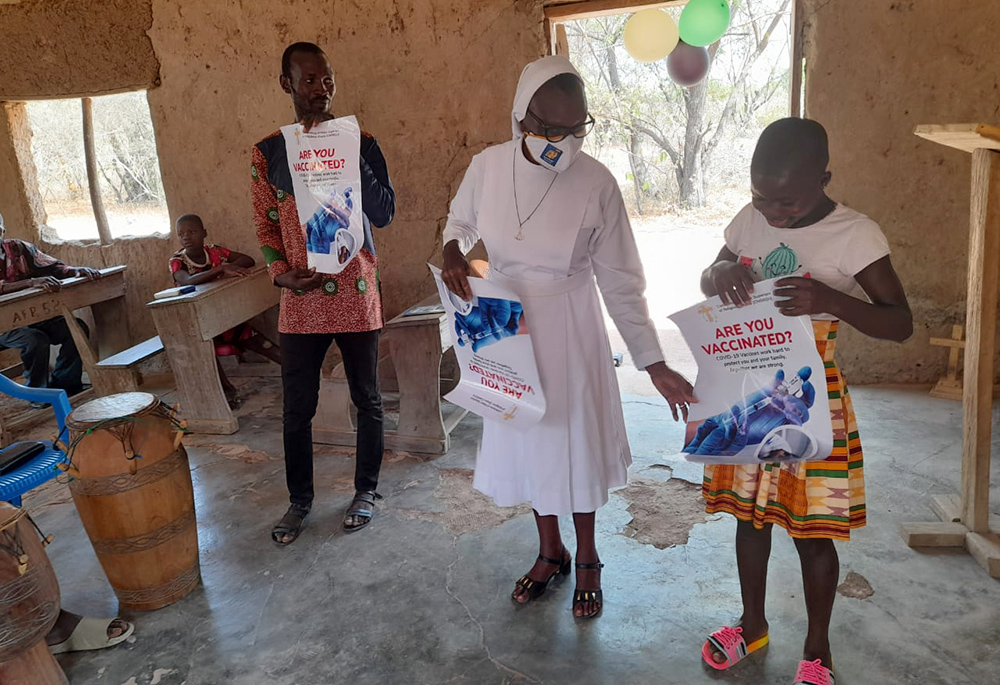
Sr. Cecilia Kudexa, a member of the Sisters of Mary Mother of the Church, educates the parishioners at Donkorkrom in the Afram Plains in the Eastern Region of Ghana as part of the Sister-led COVID-19 vaccine campaign being coordinated by Sr. Dr. Lucy Hometowu, head of the medical team. (Damian Avevor).*
It is noon, and Elijah Nayoo takes his first dose of the Moderna COVID-19 vaccine at Akrofu, a town some 84 miles northeast of this country's capital. His decision to get vaccinated followed a massive education and awareness campaign by religious sisters that encouraged him and thousands of others to get vaccinated against the virus. Nayoo received the vaccine at Mater Ecclesiae Hospital in Akrofu, run by the Sisters of Mary Mother of the Church.
Before, Nayoo believed that the vaccine was unsafe and had severe side effects on human bodies, thus vowing never to take "the jab," as it is referred to in many African countries.
"I couldn't believe that one day I would receive the COVID-19 vaccine because I have always had a negative perception about the vaccines," said the 36-year-old father of two, who works as an accountant in Accra. He got his first dose at the end of January.
Religious sisters in the West African nation of over 31 million people have been working hard to debunk COVID-19 vaccine myths that are rampant, ranging from denial that the virus exists to various false side effects. As of Feb. 16, just over 15% of the country's population is fully vaccinated, according to the Coronavirus Resource Center at Johns Hopkins University.
"I am thankful to the sisters for their key intervention towards containing the pandemic," said Nayoo, explaining that through the education he received from the sisters, he has been able to speak to his family members and friends to take their jabs, which they have willingly received without any fear or panic. A sister who is a nurse administered the vaccine. "The campaign messages changed my mind, and that of other people to avail themselves for the vaccine," he said. The information provided by the sisters was important in "demystifying the myth about the negative effects of the vaccines."
Sr. Lucy Hometowu, superior general of the Sisters of Mary Mother of the Church, said vaccine myths in Ghana and other African countries had led many citizens to forego vaccinations as virus cases and deaths are rising fast in the continent amid a fourth wave of infections.
"We have undertaken educative campaigns to demystify the myth surrounding the vaccines," said Hometowu, who is also an obstetrician and gynecologist. "Our sensitization campaign helped increase the number of people who went for the jabs and got vaccinated with Moderna, AstraZeneca and Pfizer vaccines."
Hometowu said that when they launched the Catholic Sisters COVID-19 Vaccine Ambassadors Campaign, meant to encourage people to get vaccinated against COVID-19, people were reluctant to get the vaccine despite the government's efforts to ensure there were enough doses in the country.
The campaign led by the Conference of Major Superiors of Religious in Ghana in collaboration with the Vatican COVID-19 Commission is to create awareness, educate, sensitize and undertake advocacy on vaccine safety and adherence to the protocols. The Conrad N. Hilton Foundation, a U.S. charitable foundation established in 1944 by the hotel entrepreneur, sponsors the initiative. The foundation provides grants to nonprofit organizations in seven program areas, including its Catholic Sisters program for the education and training of Catholic sisters, and to support their human development work in Africa, the U.S. and other regions globally. (The foundation is a major funder of Global Sisters Report.)
Hometowu said the sisters all over the country are using the Vatican toolkit of consistent and factual communication strategies for the campaigns to "combat misinformation and disinformation related to COVID-19 and ensure accurate information is distributed about lifesaving vaccines."
"The campaign being undertaken by hundreds of sisters from various congregations in designated areas is to complement the government and the National Catholic Health Service [a faith-based health service provider owned by the Catholic Church] COVID-19 response," she said, noting that 800 sisters are participating in the campaign.
The vaccination education effort by Catholic sisters in Ghana is also happening in other African countries.
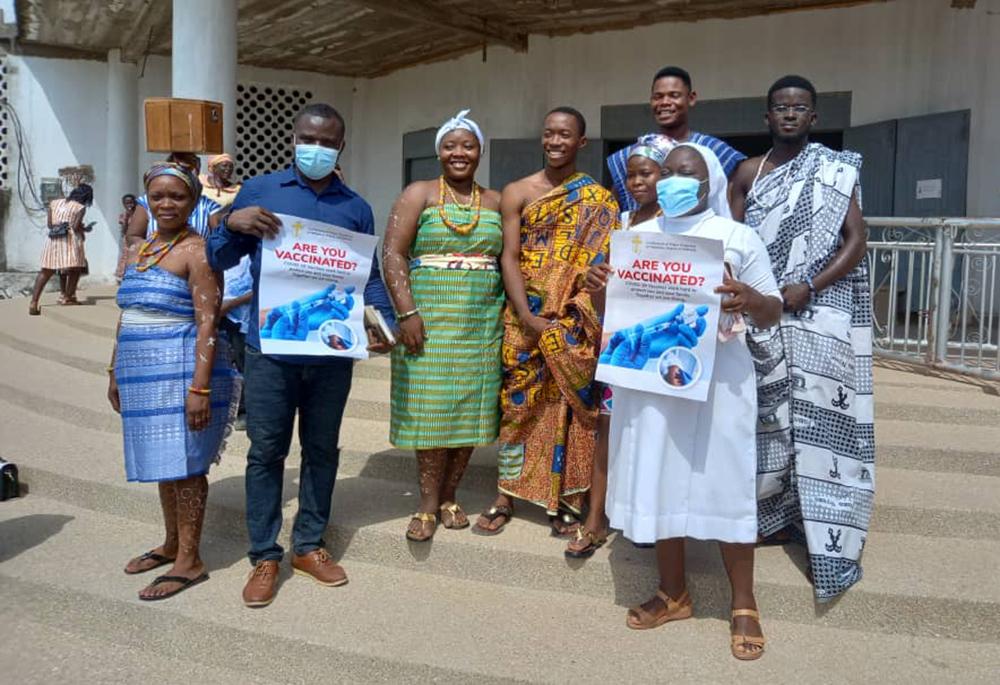
Sr. Dr. Lucy Hometowu, the COVID-19 vaccine campaign coordinator of the Sisters of Mary Mother of the Church medical team, poses for a photo with the youths at her local parish carrying a flier with a vaccine awareness message in Ho Dome, a town in the Volta region of Ghana. (Damian Avevor)
In March of last year, the Catholic Sisters Initiative at the Hilton Foundation partnered with the Vatican COVID-19 Commission to aid the church in mitigating the devastating impacts of the COVID-19 virus in Ghana, Kenya, Uganda and Zambia. Religious sisters in the four countries started campaigns to encourage millions of citizens to get vaccinated against COVID-19.
The sisters' initiatives to educate and encourage people to get vaccinated as the best means to fight the virus have paid off. Thousands of people have availed themselves at various centers run by the sisters to receive the vaccine and avoid contracting the deadly virus, said Sr. Jane Wakahiu, associate vice president of program operations and head of the Catholic Sisters program at the Hilton Foundation.
"The project has been very successful. Thousands of people have accepted taking vaccines because they have seen religious sisters themselves taking the vaccines, and nothing bad happened to them, which is a success for me," said Wakahiu, a member of the Little Sisters of St. Francis.
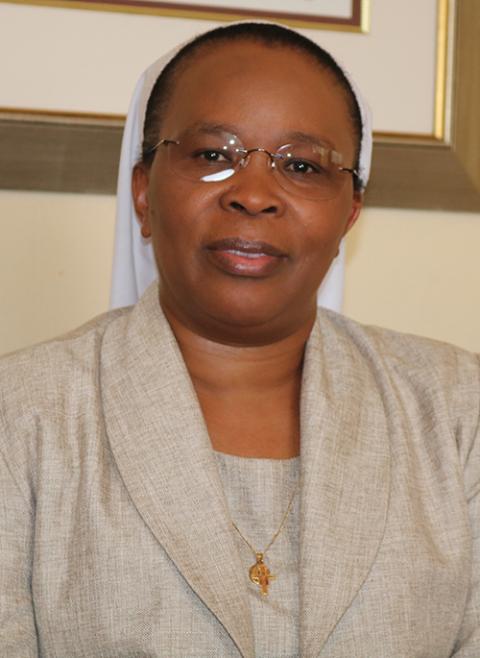
Sr. Jane Wakahiu, associate vice president of program operations and head of Catholic Sisters at the Conrad N. Hilton Foundation, says the Catholic Sisters COVID-19 Vaccine Ambassadors Campaign has helped thousands of African residents to be vaccinated. (GSR/Doreen Ajiambo)
Wakahiu said the foundation allocated $10 million to the program so that sisters working in health facilities can be imparted with knowledge about COVID-19 and vaccines and disseminate the same message to the communities they serve. The campaigns involved sisters going to homes of vulnerable people, slums, rural communities and market centers, and the mobilization of community leaders, churches and mass media.
"The reason for us starting this initiative [Catholic Sisters COVID-19 Vaccine Ambassadors Campaign] was to advocate and educate people about the vaccine because people had a lot of myths," she said. The program has since been expanded to other countries including India, Tanzania and the Democratic Republic of Congo. "Therefore, the sisters needed to provide clear education about the vaccine to reduce hesitancy. The other thing we needed was to increase the vaccine uptake so that more people can take in the vaccine, and this is in line with the Catholic social teachings to reach out to the most vulnerable and most poor who could not access the vaccine."
In Ghana, for example, between Dec. 18 to Jan. 14, sisters convinced more than 1,700 people to get the vaccine. Ghana has administered over 12 million doses of coronavirus vaccines so far.
"Through the education and advocacy by the sisters, the people had a change of mind and were vaccinated," said Sr. Mary Consolata Ntenye of the Sisters of Mary Mother of the Church, who works with Hometowu. "The government, politicians and health professionals in Ghana have put in much effort and resources in procuring these vaccines for the nation, and as citizens, it's our civic duty to get vaccinated to protect ourselves and others, our families, friends, loved ones, coworkers and above all to bring an end to the pandemic in the world."
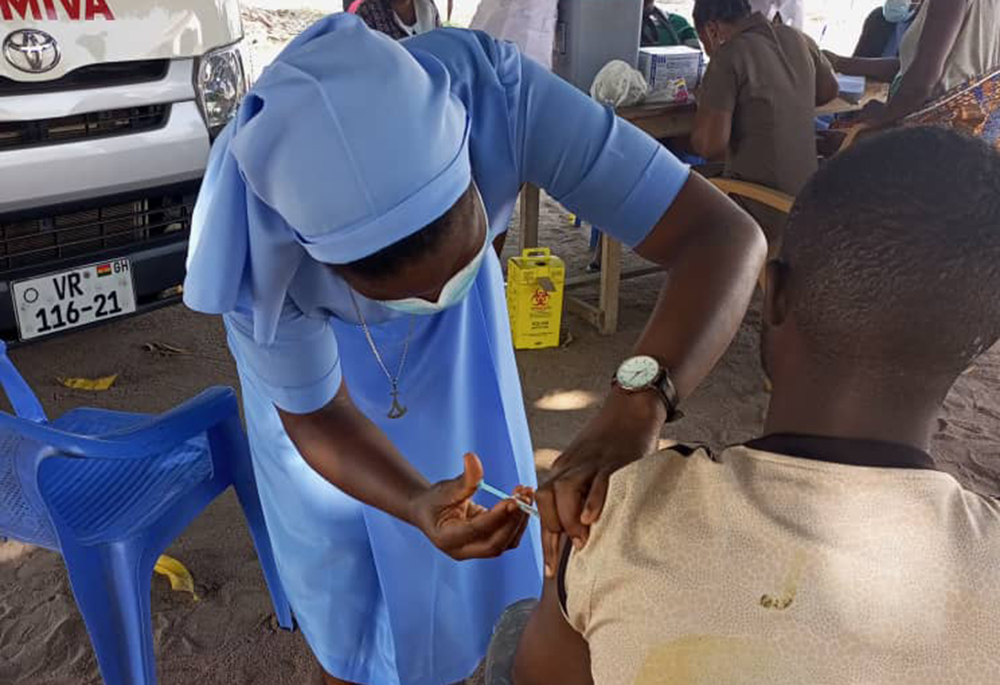
Sr. Seraphine Agorti, a member of the Sisters of Mary Mother of the Church, administers the COVID-19 vaccine to a beneficiary who accepted to be vaccinated after they convinced him through education. She works together with Sr. Dr. Lucy Hometowu in creating awareness about the COVID-19 vaccines. (Photo by Damian Avevor)
In Zambia, religious sisters have carried out a vaccine campaign that has helped reduce severe illnesses, hospitalizations and deaths. The program under the Zambia Association of Sisterhoods, or ZAS, umbrella started in June 2021, targeting 1,200 healthcare providers, including Catholic nuns and citizens.
The southern African country of over 18 million people has administered about 2.5 million doses of COVID vaccines so far, with about 9.8% of the population fully vaccinated. Sr. Astridah Banda, a member of Dominican Missionary Sisters of the Sacred Heart of Jesus, said the sisters had contributed a lot to the number of people who have been vaccinated in the country. Many people had been hesitant to take the vaccine because of a lack of adequate information on the vaccine's safety and effectiveness, she said, adding that the sisters raised awareness among members of the general public to come out and receive the jab.
Banda, the project coordinator of ZAS, said she has been running a show on Radio Maria: Yatsani Voice, dubbed the "COVID-19 Awareness Program," to share critical health information about the pandemic and also dispel vaccine myths in the country.
"Through our influence, community members have been vaccinated, and because of that, I have seen many of our colleagues get the vaccine, and it's good that the response is so far overwhelming as people are now proud to state publicly that they are fully vaccinated," said Banda, who is also a social worker by profession.
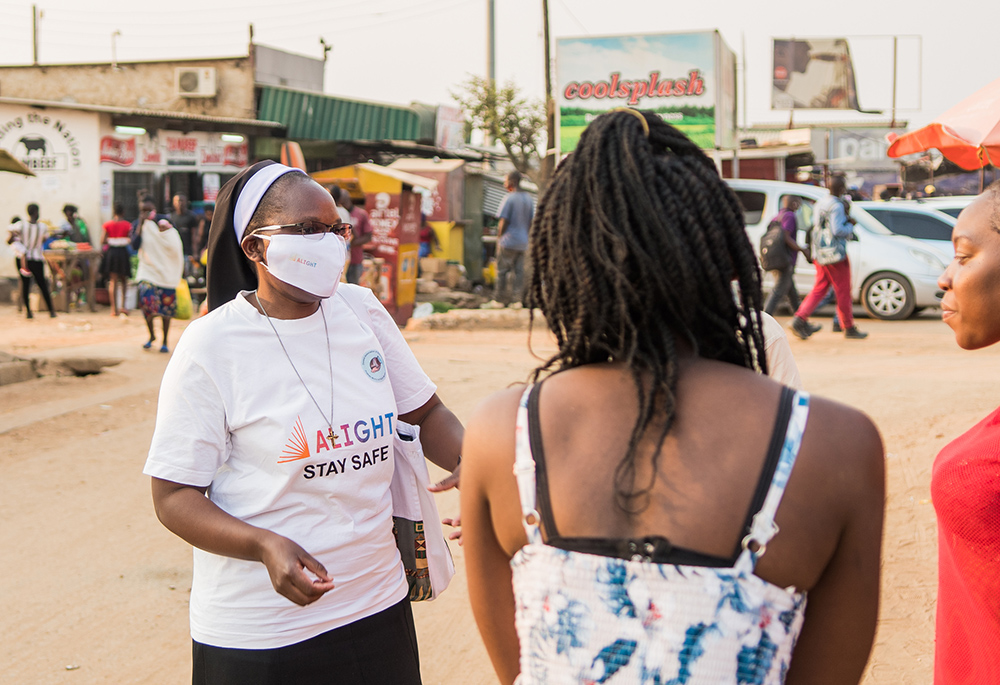
Sr. Astridah Banda, a Dominican Missionary Sister of the Sacred Heart of Jesus, carries a COVID-19 vaccine awareness campaign in the streets of Lusaka, Zambia's capital. She also hosts a radio show entitled "COVID-19 Awareness Program," where she disseminates educational messages about COVID-19 vaccines in local languages to reach the communities in rural areas where there is little access to information. (Derrick Silimina)
In Kenya, sisters through the Association of Sisterhoods of Kenya, or AOSK, have been raising public awareness and fighting myths around COVID-19 vaccines through radio broadcasts, presentations, asking priests to include information during Masses, and the distribution of printed materials to reach around five million people.
The East African nation of nearly 54 million people has administered more than 15.4 million doses of COVID-19 vaccines so far and 13.5% of the population is fully vaccinated. Since the launch, the AOSK has worked through 80 sister-run health facilities with 240 sisters across the country to reach out to millions of Kenyans.
"The vaccine uptake has increased in our hospitals," said Sr. Regina Nthenya Ndambuki, a member of the Sisters of St. Joseph of Mombasa, who is also a nurse and a psychological counselor. "Before, some of our health care (facilities) could only vaccinate 10 people a day, but nowadays the number has gone up to 50 to 70 in a day."
The East African nation of Uganda has experienced a low rate of vaccinations due to myths and misconceptions about the effects of vaccines. In a country of over 45 million people, it is estimated that roughly 5% of citizens have been vaccinated. Religious sisters have intensified the vaccination campaign to increase vaccine uptake.
Advertisement
Meanwhile, the foundation's goal has also been to train and prepare sisters who work in the health care systems in the various countries to deal with other future pandemic and non-communicable diseases.
"We didn't want sisters to come together just for the COVID-19 crisis," said Angelique Mutombo, senior program officer, Catholic Sisters (Africa) at the Hilton Foundation. "We are very aware that there are also noncommunicable diseases that sisters could be working on, like high blood pressure, diabetes among others," she said.
Mutombo said registering a network of religious sisters working in every country's health care system would help sisters swiftly respond to any other type of pandemic in a coordinated way to protect life on the frontlines without being at risk.
"Our whole idea was to bring the sisters who work in the health care system into a network to respond to future pandemics in a very coordinated way," she said.
* The caption on this photo has been updated to correct the identification of the sister.


